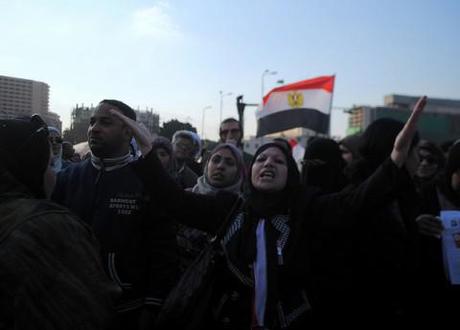
Protesters in Tahrir Square, in 2011. Photocredit lilianwagdy http://www.flickr.com/photos/lilianwagdy/6442996291/sizes/z/in/photostream/
It’s been a year since President Hosni Mubarak was toppled from power in Egypt. At a rally of hundreds of thousands this week in Tahrir Square, where the revolution began on 25th January 2011, thousands of Egyptians have remained. They’re protesting against the current interim government, the Supreme Council of the Armed Forces, and demanding a quick handover of power. Their chant is “Down with military rule.”
The SCAF had promised to hand over power within six months. No date is currently set, though it is said that nominations will begin on 15th April. Mubarak is standing trial. His wife, Suzanne Mubarak, is reported to have asked the Queen of England for help in allowing Mubarak to be treated in the UK, said Press TV. Some parliamentarians, reported Ahram, are even calling for Mubarak’s execution; others are worried that he will escape the charges of killing protesters during last year’s events.
There were also rallies in Suez, and across the country, reported the BBC. Whilst Field Marshal Mohammed Hussein Tantawi, the chairman of SCAF, reported The Daily Telegraph, tried to “minimise the scale of the protests” by lifting emergency laws in place since 1967, it was “widely ridiculed”, since an exemption was allowed for “thuggery” – a term used by the SCAF to describe protesters. 2,000 civilian prisoners sentenced under those laws have been released, including prominent activist Maikel Nabil – whose first action on being released was to post another video. Meanwhile, Egypt’s stock index has jumped six percent since the protests. There are also reports that a foreign woman was assaulted in Tahrir Square.
Currently the Freedom and Justice Party, of the Muslim Brotherhood (which was banned under Mubarak) holds the greatest number of seats in Parliament – though it doesn’t necessarily follow that they will form a government. The general consensus is that whilst some strides have been made, the military council is still corrupt, and life hasn’t changed much for the better for the populace. The young liberals are frightened that the Muslim Brotherhood is making deals with SCAF behind their backs; the Brotherhood itself is asking for celebration. What happens next remains to be seen, but democracy in Egypt is still a long way off.
“I am not here to celebrate. I am here for a second revolution. The military council is made of remnants of the Mubarak regime. We will only succeed when we remove them from power,” said unemployed Attiya Mohammed Attiya, quoted on the BBC.
Tough decisions must be made. Jon Leyne in Cairo wrote on the BBC that the “political significance” was difficult to assess. Demonstrators are complaining that not enough has been done. But the Islamists are revelling in their parliamentary success, and are engaged in talks with the military over a handover next year; liberals, on the other hand, are more “antagonistic” towards the military. Whilst the atmosphere in the square was like a “street party”, there will come a time when tough decisions will have to be made for the country to move again.
What about the people? Mariz Tadros on The Guardian’s blog said that things were getting worse for the people. It’s as if “one predatory coalition … has been replaced by another.” Of course, turbulence is to be expected. But “for how long?” Food riots are continuing; those who’ve lost their jobs blame the revolutionaries; the revolutionaries blame the SCAF. Tourism is down too, mostly because of “the lax security situation.” As for social justice – it’s becoming “increasingly exclusionary.” Muslims and Christians continue to fight; young people are “radicalised more than ever before”; representation of women in the new parliament is “shameful.” It’s likely that the resitance movement will continue.
The bravery of bloggers. Activists continued to rally the troops: The Guardian rounded up some blogger’s voices. Hossam el-Hamalwy wrote that the fight should continue to “take Tahrir to the factories and workplaces to bring a final end to this regime.” Gigi Ibrahim wrote that it was “never a surprise” to her that SCAF would still be in power. It’s still “only the beginning of the revolution.” American journalist Sallie Pisch said she thought that “with perseverance and compassion Egyptians can move forward, keeping both security and liberty.”
Looking to the future. 100 people have been killed since the military took control, said Leila Fadel on The Washington Post. But there have been “accomplishments.” “Wider freedom of speech, the power of the Egyptian voice and a newly elected parliament that … will force the people’s will upon Egypt’s military rulers.” She quoted a medical student, Abdullah: “The Square still has power.”

